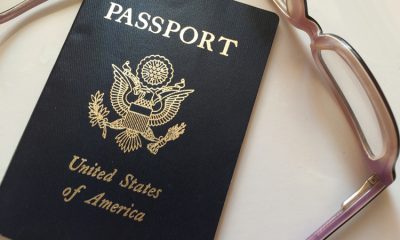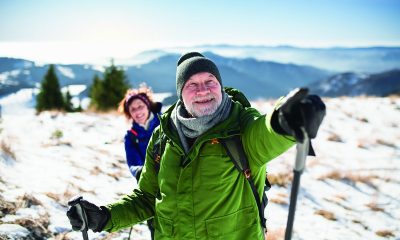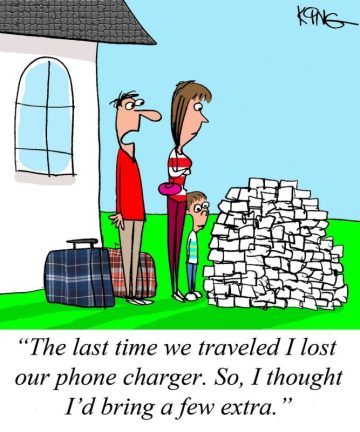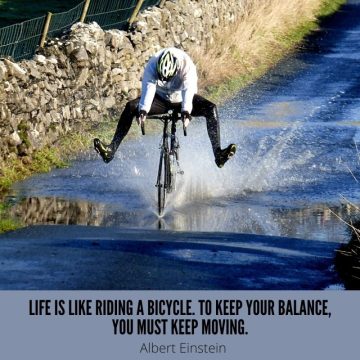Travel
Personalized trips: creating unique travel experiences

Are you the kind of traveler that likes to venture off the beaten path? Do you long to create memorable trips without the hassle of planning them? Enter the travel agent of the modern age: your partner in creating the customized experience you long for.
A tailor-made experience
Whether you wish to wine and dine in Italian vineyards or hike through the Australian Outback, your travel planner can do the legwork involved in building an itinerary, one that’s truly tailored to your preferences, needs and desires.
Typically, these experts work with local guides and organizations to ensure you get a unique experience. How much they map out of your trip depends on you, but planning is typically comprehensive and based on the activities you want to take part in and how long you want to spend at each location.
A convenient service
Beyond helping you create the perfect itinerary, your travel planner will take care of everything from plane tickets to hotel rooms, guides, activities, restaurant recommendations, car reservations and even private drivers. By working with an experienced agent, all you’ll need to do is pack and enjoy the adventure.
Travel
Passport Renewal: Essential for Spring Travelers
Spring travelers, take note! Before you start packing your bags for that long-awaited international trip, there’s an important detail you can’t afford to overlook: your passport. Passports, with their 10-year validity, are often forgotten in the hustle and bustle of travel preparations, but they are crucial for smooth travel experiences.
If you’re planning to travel abroad soon, it’s imperative to check your passport’s expiration date now. Remember, many countries have specific passport validity requirements. For instance, if you’re heading to New Zealand, your passport must be valid for at least three months beyond your trip’s duration. Additionally, ensure you have enough blank pages in your passport for visas – typically, two of the 17 visa pages should suffice.
It’s also crucial to ensure that the name on your identification matches the one on your passport to avoid any travel hiccups. This might seem like a small detail, but it’s a common cause of travel disruptions.
When it comes to renewing your passport, timing is key. Allow yourself approximately 15 weeks to apply for and receive your new passport. This timeframe includes around 10 weeks for processing plus additional time for shipping. While you might receive your passport earlier, it’s always better to plan ahead and leave ample time for any unforeseen delays.
A quick passport check now can save you a lot of stress later. Make sure your passport meets all the necessary requirements for your destination, and start the renewal process early if needed. Happy travels!
Interesting Things to Know
Escaping Winter’s Chill: A Snowbird’s Guide to Seamless Travel
Preparing for Your Sun-Kissed Getaway.
When winter blankets the land with snow and sends icy gusts howling down the streets, the idea of migrating to warmer climes, much like the birds, becomes incredibly appealing. If you’ve been dreaming of becoming a snowbird and escaping the chill, it’s essential to plan wisely to ensure a smooth journey.
The Checklist to a Perfect Winter Escape
- Balancing the Books: First and foremost, ensure that your finances can support this significant lifestyle change. Whether you’re on the brink of retirement or just craving an extended getaway, setting a realistic budget is crucial. Consulting a financial expert can help avoid unforeseen complications, especially around taxes.
- Home Away from Home: Envisioning where you’ll nest in your tropical escape is key. Be it a cozy chalet, a breezy condo, or a snug campsite, early reservations can guarantee you a spot in paradise.
- Health Comes First: Ensure that you’re medically ready for this shift. Regular checkups with your primary doctor, dentist, and other specialists are necessary. They can guide you about necessary vaccinations and ensure you have enough medication supplies for your trip.
- On the Move: Are you dreaming of a road trip, a quick flight, or an RV adventure? Each mode of transport has its charm. A chat with a travel expert can guide you to the best choice. If you’re hitting the road, a thorough vehicle check-up ensures you start on a good note.
- Protection and Peace of Mind: Life is unpredictable. Secure comprehensive insurance that caters to your health and property needs. Especially when venturing to new places, adequate coverage can be a lifesaver.
- Home Sweet (Secure) Home: While you’re basking under the sun, ensure your primary residence remains well-maintained. From managing bills to ensuring your plants are watered, having someone reliable to oversee things is invaluable.
Embracing the Snowbird Life with Confidence
While the lure of sunnier shores can be compelling, the key to truly enjoying this nomadic life lies in meticulous planning. Whether it’s understanding finances or ensuring your health and accommodation, being thorough ensures your winter escape is more paradise and less predicament.
Health
Steering Clear of Traveler’s Thrombosis: Tips for a Healthy Journey
Simple Strategies to Prevent Deep-Vein Thrombosis During Long Travels.
Traveling long distances, whether by road or air, brings with it the risk of deep-vein thrombosis (DVT), a condition that can have serious, even fatal, consequences. However, with a few simple precautions and exercises, travelers can significantly reduce their risk of developing DVT. The Coalition to Prevent Deep-Vein Thrombosis emphasizes the importance of staying active and hydrated during long trips to ensure a safe and healthy journey.
DVT occurs when a blood clot forms in a major vein, often in the leg. This can happen when sitting still for extended periods, such as during long flights or car trips. To combat this, experts recommend walking for at least 30 minutes before embarking on a journey. This initial activity helps stimulate blood circulation, setting a healthy precedent for the rest of the trip.
Once on the road or in the air, it’s crucial to take short walks whenever possible. During car trips, this can mean stopping at rest areas or scenic spots to stretch your legs. Walking up and down the aisles periodically can be beneficial for air travelers. These brief walks help maintain blood circulation and reduce the risk of clot formation.
In addition to walking, there are several simple stretches and exercises that can be done while seated. Rotating the shoulders, flexing, and pointing the toes are easy yet effective ways to keep the blood flowing in the extremities. Elevating the feet can also be helpful, which can be done by propping them up on luggage or, in a car, on the dashboard.
Another critical factor in preventing DVT is hydration. The Coalition advises drinking at least one glass per hour of water. Staying hydrated helps thin the blood, reducing the likelihood of clot formation. It’s important to note that beverages like coffee or alcohol, which can lead to dehydration, should be consumed in moderation during travel.
Incorporating these simple but effective strategies into your travel routine can significantly reduce the risk of developing a traveler’s thrombosis. Regular movement, stretches, proper hydration, and foot elevation are key to maintaining good circulation and ensuring a safe and healthy journey. Remember, a little effort can go a long way in preventing serious health issues like DVT.
Business
Soarigami: A Novel Solution to the Airplane Armrest Dilemma
Innovative Gadget Promises Peace in the Skies
Air travel, often marred by cramped spaces and minor discomforts, presents a unique challenge: the armrest battle. This common yet unspoken struggle over the ownership of a single armrest has been a source of silent contention among passengers. However, an inventive solution is on the horizon, aiming to bring harmony to the skies.
Arthur Chang, the brain behind this groundbreaking idea, introduces Soarigami – a clever device designed to transform a single armrest into a space for two. Retailing at $20, this portable gadget easily attaches to the existing armrest, creating an equitable division for both passengers. This innovation is a practical solution and an exercise in courtesy and shared space.
Soarigami’s concept is rooted in the basic principles of sharing and civility, harkening back to childhood lessons. It addresses the age-old question: To whom does the armrest belong? Is it merely a physical barrier or an unspoken prize for the person sandwiched in the middle seat? Chang’s invention steers away from the notion of survival of the fittest, instead fostering a sense of communal respect and cooperation.
In his conversation with The Wall Street Journal, Chang highlighted the additional benefit of Soarigami as a conversation starter. By offering to share the armrest using Soarigami, a passenger extends an olive branch and potentially gains a ‘moral triumph.’ In the scenario where the offer is declined, Chang notes, the initiator can claim the armrest with a clear conscience, having made a gesture of goodwill.
Soarigami emerges as a simple yet effective answer to one of the many quirks of air travel. It’s a testament to human ingenuity in solving everyday problems and enhancing the shared experience. As this novel product takes flight, it promises to make the skies a little friendlier, one armrest at a time.
Travel
Journey through Time: Norfolk to Blacksburg and Virginia Beach to Abingdon Road trips among America’s favorites
In recent years, weekend road trips have experienced a surge in popularity among families. These mini-getaways offer a refreshing escape that combines adventure, flexibility, and quality time spent together, all at a significantly lower cost compared to conventional summer beach destinations.
Gunther Motor Company carried out a survey of 3,000 regular road trippers to find out the most popular 100-weekend road trips they would most like to experience in summer 2023.
A remarkable accolade has been granted to two of Virginia’s road trip routes, with the Norfolk to Blacksburg via U.S. Route 460 journey voted as America’s 16th favorite weekend road trip and the Virginia Beach to Abingdon via U.S. Route 58 trip rated as the 42nd best nationally.
Starting in Norfolk, a coastal city known for its naval history and waterfront attractions, road-trippers can explore charming neighborhoods, visit various museums, and indulge in seafood delights. As they head west on U.S. Route 460, the scenery changes to farmlands and rolling hills. Historic towns such as Suffolk and Petersburg appear along the route, each offering unique charm and insights into Virginia’s rich past.
The trip culminates in Blacksburg, home to Virginia Tech University. Nestled in the scenic Blue Ridge Mountains, this college town offers a range of outdoor activities, a vibrant atmosphere, and a thriving local arts and culture scene.
In a similar vein, the Virginia Beach to Abingdon road trip along U.S. Route 58 offers views of picturesque countryside, rolling hills, and rural communities. Along the route, visitors can explore historical sites like the Suffolk Historic District and the quaint downtown of Franklin.
Continuing west, the landscape gradually transforms into the scenic beauty of the Appalachian Mountains. Towns like Galax and Marion dot the route, leading finally to Abingdon, a historic town renowned for its vibrant arts scene. Visitors can explore Abingdon’s historic district and immerse themselves in the local culture, marking a fitting end to an enriching journey.
Infographic showing America’s 100 favorite weekend road trips
“America is a treasure trove of interesting and diverse weekend road trips. From the towering mountains and vast plains to vibrant cities and charming small towns, each journey paints a unique portrait of our nation’s rich tapestry. Every route has its own story to tell, fostering an exploration that unveils the heart and soul of America,” says Joseph Gunther IV of Gunther Motor Company.
Travel
Experiential travel turns tourists into adventurers

If conventional guided tours and museum trips leave you a little itchy, or if you just want to try something totally new, experiential travel might be for you. Instead of just visiting a destination and taking in a random assortment of attractions, experiential travel immerses tourists in their environment so they can actively engage with the culture, history, and people.
Wellness enthusiasts can check out yoga retreats in Tulum or a few days of mindfulness and healing in the Dominican Republic. For those who like a physical challenge, try a multi-day biking tour through Ireland.
Experiential travel is ideal for foodies who want to experience authentic local cuisines. Book a food tour of Athens to sample local wines and some of the world’s best baklava. Very committed food explorers can embark on a 12-day culinary journey through Japan that includes everything from Osaka street food to tea ceremonies in the famous teahouses of Kyoto.
Nature lovers can travel to southern Africa to stay in the safari camps of the Okavango Delta in Botswana before heading to Zimbabwe’s spectacular Victoria Falls. The nine-day journey ends in Hwange National Park to see spectacular wildlife up close.
Military history buffs might find a life-changing and emotionally challenging experience with the 11-day Band of Brothers Tour, which follows the path of the legendary Easy Company of the 101st Airborne Division as they crossed the English Channel to liberate Europe from Nazi control. The tour begins in England before heading for the beaches of Normandy, then follows Easy Company through Belgium, the Netherlands, Luxembourg, and Germany.
























































































